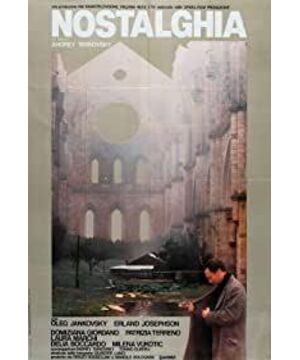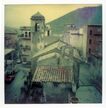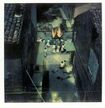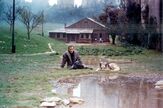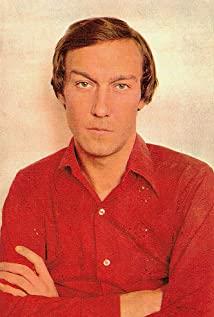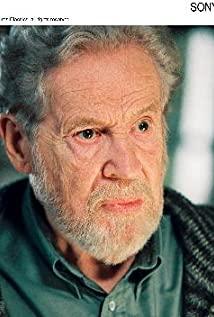Original address: http://www.qh505.com/blog/post/6474.html
Long shot of 9 minutes and 6 seconds: Andre lit the candle in his hand, walked into the St. Catherine hot spring pool that had been drained, took a few steps forward and came back, stretched out his left hand and touched the stone wall of the hot spring pool, as if in the hot spring pool. The starting point made a mark, and then moved forward cautiously; the candle light swayed in the wind, and Andre looked forward while looking at the candle; the wind finally blew out the candle, and Andre went back to the starting point, then lit the candle again, and continued along the Going in the direction just now, the candle light was still swaying in the wind. Andre blocked the wind with his windbreaker, but the wind still blew out the candle before he took a few steps; he came back again, lit the candle again, started from the origin again, and used his clothes again. Or the palm of the hand to block the wind; slowly, Andrei has approached the stone wall opposite the hot spring pool, he put the candle on the stone wall, the wind blows the candle light, the candle light is swaying but not extinguished.
From the marked stone wall to the final stone wall, this is a route map consisting of the starting point and the end point. The candle is extinguished, the candle is extinguished again, and the candle is finally not extinguished. The long shot of 9 minutes and 6 seconds completely records the entire In the process, when the lit candle swayed in the wind, Andre completed a miracle. According to Dominica, this hot spring pool was named after St. Catherine who spoke to God. The candle light is not extinguished is a miracle, and this The meaning of the miracle is the redemption of the world. "If someone can walk through this hot spring with a candle and the candle does not go out, then the world will be saved." Because Dominic locked his family in the house for seven years, he was arrested The locals called it a lunatic and lost the opportunity to enter the hot spring pool. When he handed this task to Andre, and Andre completed the act with his own efforts, a miracle was born.
However, the miracle collapsed in another way: when Andre finally put the burning candle on the stone wall, he himself fell down. It seemed that his body, which had suffered from heart disease for many years, could no longer bear the pressure in his heart. Andre went back to the starting point again and again and continued to walk. Carefully, he had already felt discomfort, but he did not stop. In the end, the pain of the ninja came to an end, a miracle was born, but life stopped. When the immortality of the candle becomes a miracle and a redemption for the world, why can't he redeem himself in a miracle? Isn't this a parable about the quenching of the fire of life? When Andre completed the miracle with the death of an individual, on the streets of Rome, Dominic also burned himself in another way: he climbed the statue of a knight and gave a speech to the passing crowd: "Your spiritual path has been shadowed. Shrouded, let's listen to the insects, let's stretch our souls, let's hold hands - freedom is useless..." The prepared music seemed to be unable to play, but Dominic had already poured gasoline on him, shouting After "Mother" came out, he continued to give a speech on the loss of human belief, "The water in your body is fire, then ashes and bones..." Finally, he turned on a lighter, then lit himself, and the fire was in him Burning, he finally fell off the statue and fell there without moving.
Dominic believes that human beings have gone astray and have lost faith, so he warns by igniting his own body. The most direct way to present the result of this martyrdom is death. One achieves redemption by spontaneous combustion on the streets of Rome, and the other achieves redemption by burning candles in a dry hot spring pool, but they both sacrificed their lives and even performed miracles in the fire, when the meaning of faith If miracles on the planet occur together with death in the individual sense, can they really save others? Can it really awaken faith? "The water in your body is fire, then ashes and bones." Andre and Dominic both walked towards their ashes and bones in the end, and they couldn't even see the meaning of this miracle to others. What seems even more tragic is that they only created miracles on a "private" level: Andrea walked the road of miracles alone, and there was no spectator beside him, let alone anyone who was moved, while Dominic The reason for choosing Roma Street is to obtain a group effect, but when he ignites himself, the people next to him also become bystanders. They are even indifferent, just like watching a performance, and do not have anything to do with their own life. Impact.
When miracles and redemption turned into ashes and bones, the tragic sacrifice seemed to permeate Andrei Tarkovsky's strong pessimism, or that neither Andrei nor Dominique could construct a "Preaching"-style sacrifice scenes, all beliefs, all redemptions, and all going back have also become an individual behavior, and does this mean that the search for nostalgia and the return to hometown are just a fantasy Existence? Just like the verse sung by Andre: "I am the candle, I perish in the feast, and put away the tears of the candle after dawn..." The extinction of the candle has become fate, they may still be the lunatic in the local population, female translator The "saint" who is ridiculed in his mouth can only be ignited in his own holy fire, and finally extinguished mercilessly.
In fact, when they become an individual sacrifice, they have actually been alienated by "others", and Andrei left his hometown and came to Italy to write a biography of the musician Sosnovsky , Sosnovsky once lived in Italy, but later returned to Russia because he couldn't bear the "cold in a foreign land". This was a return, whether he fell in love with a female serf or satisfied his nostalgia, he went back, but In the end, it was also "ash and bones", because he could no longer find the feeling of his hometown, and he chose to commit suicide. Sosnovsky is a prophetic text, and Andrei's return and death are more like a copy of this text, so the Italian translator Eugenia once asked Andrei: Why did he return to Russia ? In fact, this is the most crucial question. Why go back is to the question of a "present" that cannot be integrated, because he cannot become a present present, he must find the meaning of his existence in the past and in his hometown, but his hometown has been It is no longer that hometown, when everything has changed, going back becomes "can't go back".
The estrangement between the past and the present is the separation of reality and belief, the separation of the self and the other, and when Andrei goes back to Sosnovsky's path, he falls back into this separation and estrangement. Like he said to Eugenia: "Poetry is untranslatable." He knows that some barriers can never be eliminated, but his prejudice is that he wants to find a kind of communion, such as he said that poetry is untranslatable At the same time, he said that "only music is connected". He saw the natural gap between different languages, but he tried to find another way to connect. But is there really an essential difference between music and poetry? On the other hand, he even expects to use tools to overcome this incommensurability, just like he is not good at Italian, so he let Eugenia do the translation, and there is an irreparable contradiction between the two people, not only Only about the translation of individual words, but also the understanding of different beliefs, truths and cultures, Andrei said conceitedly to Eugenia: "None of you can understand Russia." Eugenia also retorted: " You also don't understand real Italy."
Finding commonalities in music and using "translation" tools to talk, this is Andrei's way of breaking down barriers, but "None of you can understand Russia" has locked himself in his private hometown, which is of course closed The door that allows the outside world to lead to one's own heart, the so-called loner, is immersed in a world that he never opens. When Eugenia and Eugenia came to the country church, the Italian Eugenia seemed to be interested in it all, she praised the beauty presented there, while Andrea walked in Eugenia After a long time, he said to himself: "I'm tired of these morbid beauty, and I don't want anything but myself." Although Eugenia is his translator, she has a deep love for Andrei in her heart. , she will ask if she has called her wife in Moscow these two days, she will say to Andrei in the house: "There is no water in my room." But Andrei seems to be indifferent to her, he even just Take her as an interpreter, that visit Dominic back in the house, Eugenia is blowing her hair, Andre tells him about the meaning of Dominic candles, Eugenia doesn't seem interested, Andre asks Hers: "Why are you so scared, you're not free, and you don't understand." Eugenia's answer: "Because you're a saint and you want the Virgin to show one breast." Eugenia finally left Andre, she asked Andre to go back to his wife, and later she called and told Andre that she was going to India with her man.
Andre has a strong closeness. There is a language gap between him and Eugenia, but it is more about the dialogue between the self and the other, and when Eugenia mocks him as a "saint" , but gave him the Virgin Mary who "exposed one breast" as the interlocutor. The combination of the Virgin and the breast, as well as the single one, are all a piercing satire of Andre's "nostalgia", and Andre lived in In the world of self-sanctification, in this world, his door was closed - but he found a channel of dialogue in Dominic, because Dominic, like him, became the crowd in self-sanctification Incomprehensible "madman". At the beginning, Eugenia acted as a bridge between them and talked with Dominic, expressing Andre's idea of having a chat with him, but Dominic refused, and the second attempt still failed, Eugenia Angrily refused to translate and left. Andre then approached Dominic himself, and in the mottled and damp room, the two saints began a conversation about redemption.
Dominic once locked himself and his family in the house for seven years, so the locals regarded him as an unreasonable madman, and he also lost the opportunity to enter the hot spring pool of St. Catherine. On the one hand, he has no right to enter the hot spring pool. It is also a relief, because the hot spring pools are filled with dignitaries and nobles, "Why do they soak in the water? Because they want to live forever." Catherine is said to have seen God, and the hot spring named after her The pool is a symbol of holiness, but those men and women are soaking in the pool just for immortality. This is such a worldly desire to satisfy, and in Dominic's view, it is a kind of depravity. So he shut himself and his family in the house for rescue. On the other hand, the hot spring pool is still a holy existence, and you can't enter the pool yourself, so leave this task to Andre, as long as the candle does not go out, then the world will be redeemed, and the end of the day will be delayed. "Please help me." This is Dominic's request. The candle is handed over to Andre, which is a kind of redemptive handover, just like the "1+1=1" written on the wall in the room. In Dominique's view, there is only one faith, and there is only one road to salvation. "A drop of water and another drop of water can only be one big drop of water, not two."
The equation of 1+1=1 makes Andre and Dominic a redeeming one, one a lunatic disenfranchised by the locals, the other one who considers himself a saint but "wants the Virgin to show a breast" Homesick people, the first thing they want to save is their self-belief - Dominic chooses to set himself on fire on the street, which is a kind of madness and an extreme, and Andre is different from him in that he walks in a fragmented reality He lives in an untranslatable estrangement, all kinds of depression and heaviness, all kinds of imprisonment and fantasy, so that he can't find the way back. For Andrei, the hometown is by no means a substitute for "Russia". Sosnovsky once said in a letter: "If I don't go back to Russia, if I don't see my hometown, I will die." But going back is the same as ending in depression. When going back becomes the return of a single geographical space, it is also a kind of emptiness, and even more painful loss. For Andre, the hometown is not only about having his own wife and children, but also "nothing" that can never come back, which is a kind of "mother complex": Andre always sleeps in his sleep It was the woman who heard someone calling his name and called out loudly. It was the pregnant woman lying on the bed. She was a mother. In another world where life has not yet been born and was named, mother actually means pregnancy and suffering. , which is characteristic of the Russian nation.
The point is that in the process of sanctifying himself, Andre couldn't return to his mother at all. The purest and best memory remained in Andre's heart, and it had become a holy picture: the child and the mother. The woman walks on the hillside, and then stands there, in the distance is the dense fog, the white horse - this image is not reality, it is Andrei's phantom, an extension of self-sanctification, like He always faces the mirror, and in the mirror is a self, and in the mirror there is the mirror, and there is another self, Andre, another Andre, another Andre's Andre, it is a kind of The way of multiplication completes Andre's naming of the self, if according to Catherine: "You are not you, but I am existence." Then this me in the mirror, the me in the mirror in the mirror, is it not forever real existence? Andre dreamed that he was walking into a foggy church and heard the dreamy voice of his mother, that is, after he died of a heart attack, in the final scene he was sitting in front of a pond with the dog , behind him is the monastery, which is the place where he finally returned, like a dream, like a miracle.
Whether it is Dominic or Andre, in the incommensurable reality, they can only build their own dream kingdoms, and in the sins of faith that destroys the world and degenerates, they can only create miracles by means of sacrifice. However, when Andrei Tarkovsky annotated the meaning of "nostalgia" in such a tragic way, on another level he was of course reflecting on the alienated existence of human beings leaving their homeland. Why did Andre never return to his hometown? It's because the hometown itself no longer exists, the mother has been ruthlessly deconstructed, the estrangement that poetry cannot be translated, the deprivation of access to the hot spring pool, the indifference in self-immolation, the unfreedom of self-imprisonment, what dialogue, what purity , what other beliefs, what miracles? ——Eugenia entered the monastery, and the steward asked her: "Are you here to ask for a child or something?" Eugenia said: "I just came to see." The steward asked back: "If everyone is like this, What other miracles will there be?" He offered the easiest way to kneel down, which is of course the most mundane method, and what this mundane dissolves is the true meaning of faith, and the miracles mentioned by the minister are only In order to have children, "a woman is destined to have children, to nurture them." The mother is for children, and when the mother is only to give birth, she returns to her instrumental existence, and the ritual that is taking place in the monastery becomes "the piety It is the woman who prays for the alienated reality, "Mother of all mothers, Mary who knows the pain of motherhood, Mother of all mothers, Mary who knows the joy of motherhood; Mother of all children, Mary who knows the joy of pregnancy, Mother of all children, Virgin who knows the pain of motherhood; Virgin who knows all, help your daughter to become a mother..." Then, the hot springs of St. Catherine became the bathhouse of immortality, and the Virgin revealed a lustful breast , so the miracle used for redemption was left with ashes and bones.
View more about Nostalghia reviews


